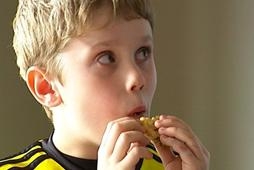Allergies: the 'invisible disability'
http://www.3news.co.nz/Allergies---the-invisible-disability/tabid/423/articleID/297528/Default.aspx
Finn Harris has to watch what he eats
This week is Allergy Awareness Week, highlighting the fact that one in 10 babies born in New Zealand will develop an allergy.
New Zealand has one of the highest allergy rates in the world, and it's rising.
Ten-year-old Finn Harris loves playing the guitar and lots of other things regular kids do. His family tries to normalise life as much as possible, despite Finn being one of the most allergenic children in the Wellington region.
"He's allergic to wheat, eggs, dairy products, nuts, peanuts, sesame seeds and a few other strange things – barley, pork and green beans," says Finn's mother, Anna Farrier.
But it's not just food – it can also be cats, dogs and dust mites.
"It's quite challenging, 'cause sometimes I get bullied at school," says Finn. "Sometimes at parties when people are eating food that looks really nice and I would like to eat it, it's quite hard."
Ms Farrier describes it as an invisible disability. There's nothing wrong with Finn until he has an allergic reaction. The extent of that reaction depends on how much of a food he's come into contact with.
"At the start my eyes they get a bit itchy and the inside of my mouth it gets all itchy and stuff like that, and then I might start coughing a bit or I might get hives, and it's just a really horrible feeling," says Finn.
"He'll start coughing, which is a sign his throat is starting to close over," says Ms Farrier. "He also can also get welts on his skin, vomit, diarrhoea so there's a whole range of symptoms."
Finn takes an emergency kit everywhere he goes. It contains two EpiPens, an anti-histamine, ventolin and information.
"EpiPen, what you do with it is you take it off and you get it and you bang it on your leg," says Finn.
He has two siblings, but his allergies mean everything has to be kept separate.
"We have separate utensils, separate cutlery, pots and pans, separate baking dishes," says Ms Farrier.
Some foods are banned from the house because the risk of cross-contamination is too high.
"Flour, because if you open a bag of flour it puffs up into the air and it's hard to get rid of all traces of it, milk because once it's spilt it splatters everywhere," says Ms Farrier.
As Finn starts to get older and starts to manage his allergies himself, his mother says the chance of having allergic reactions increases again.
"At the end of the day it's Finn that has the food allergies, not us, and we've got to give him the skills to live with it forever."
Expert opinions differ on whether Finn will grow out of any of his allergies. The Harris family just has to wait to find out.
ที่มา: http://www.3news.co.nz/Allergies---the-invisible-disability/tabid/423/articleID/297528/Default.aspx
วันที่โพสต์: 7/06/2556 เวลา 02:51:44 
![]()
![]()
แสดงความคิดเห็น
รายละเอียดกระทู้
Allergies: the \'invisible disability\' http://www.3news.co.nz/Allergies---the-invisible-disability/tabid/423/articleID/297528/Default.aspx Finn Harris has to watch what he eats This week is Allergy Awareness Week, highlighting the fact that one in 10 babies born in New Zealand will develop an allergy. New Zealand has one of the highest allergy rates in the world, and it's rising. Ten-year-old Finn Harris loves playing the guitar and lots of other things regular kids do. His family tries to normalise life as much as possible, despite Finn being one of the most allergenic children in the Wellington region. "He's allergic to wheat, eggs, dairy products, nuts, peanuts, sesame seeds and a few other strange things – barley, pork and green beans," says Finn's mother, Anna Farrier. But it's not just food – it can also be cats, dogs and dust mites. "It's quite challenging, 'cause sometimes I get bullied at school," says Finn. "Sometimes at parties when people are eating food that looks really nice and I would like to eat it, it's quite hard." Ms Farrier describes it as an invisible disability. There's nothing wrong with Finn until he has an allergic reaction. The extent of that reaction depends on how much of a food he's come into contact with. "At the start my eyes they get a bit itchy and the inside of my mouth it gets all itchy and stuff like that, and then I might start coughing a bit or I might get hives, and it's just a really horrible feeling," says Finn. "He'll start coughing, which is a sign his throat is starting to close over," says Ms Farrier. "He also can also get welts on his skin, vomit, diarrhoea so there's a whole range of symptoms." Finn takes an emergency kit everywhere he goes. It contains two EpiPens, an anti-histamine, ventolin and information. "EpiPen, what you do with it is you take it off and you get it and you bang it on your leg," says Finn. He has two siblings, but his allergies mean everything has to be kept separate. "We have separate utensils, separate cutlery, pots and pans, separate baking dishes," says Ms Farrier. Some foods are banned from the house because the risk of cross-contamination is too high. "Flour, because if you open a bag of flour it puffs up into the air and it's hard to get rid of all traces of it, milk because once it's spilt it splatters everywhere," says Ms Farrier. As Finn starts to get older and starts to manage his allergies himself, his mother says the chance of having allergic reactions increases again. "At the end of the day it's Finn that has the food allergies, not us, and we've got to give him the skills to live with it forever." Expert opinions differ on whether Finn will grow out of any of his allergies. The Harris family just has to wait to find out. Read more : http://www.3news.co.nz/Allergies-the-invisible-disability/tabid/423/articleID/297528/Default.aspx#ixzz2UCgzHpvA
จัดฟอร์แม็ตข้อความและมัลติมีเดีย
รายละเอียดการใส่ ลิงค์ รูปภาพ วิดีโอ เพลง (Soundcloud)


